-
 Art of Wellness Acupuncture & Traditional Chinese Medicine (TCM)11704 Wilshire Blvd, Suite 295, Los Angeles, CA, 90025
Art of Wellness Acupuncture & Traditional Chinese Medicine (TCM)11704 Wilshire Blvd, Suite 295, Los Angeles, CA, 90025
myartofwellness@gmail.com310-451-5522 Office Hours
MonClosedTue7:30 am --4 pmWed7:30 am --4 pmThu7:30 am -- 4 pmFri7:30 am -- 4 pmSat7:30 am -- 4 pmSunClosedOur office opens from Tuesdays to Saturdays 7:30 am to 4 pm, will be closed on Memorial day, Independent day, Labor day, Thanksgiving day, Christmas and New year.
-
Recent Posts
- Acupuncture for Sciatica Pain
- Can Acupuncture Help With Bladder Control?
- How to Treat De Quervain’s Tenosynovitis With Acupuncture and TCM
- Chinese New Year 2026: Year of the Horse
- Acupuncture and TCM Treatment for Perimenopause Symptoms
- How to Treat Insulin Resistance With Acupuncture and TCM
- How to Treat Metabolic Syndrome With Acupuncture and TCM
- How to Treat Syncope With Acupuncture and TCM
- How to Treat Thoracic Outlet Syndrome With Acupuncture and TCM
- How to Treat Dupuytren’s Contracture With Acupuncture and TCM
- How to Treat Nutcracker Syndrome With Acupuncture and TCM
- How to Treat Rosacea With Acupuncture and TCM
- How to Treat Perioral Dermatitis With Acupuncture and TCM
- Lymphatic Drainage With Acupuncture and TCM
- How to Treat Turf Toe With Acupuncture
- How to Treat Nerve Pain With Acupuncture and TCM
- Sign up to receive news and updates and get my free report:“The Top 10 Reasons to Try Acupuncture”

February 2026 M T W T F S S 1 2 3 4 5 6 7 8 9 10 11 12 13 14 15 16 17 18 19 20 21 22 23 24 25 26 27 28
Immune System
How to Treat Rosacea With Acupuncture and TCM
By Xiaomei Cai, L.Ac., Ph.D. and Qineng Tan, L.Ac., Ph.D.
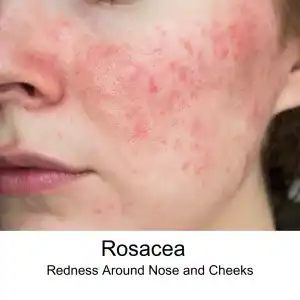
Facial flushing? Persistent redness, tiny bumps, or a burning sensation across your nose and cheeks? These can be signs of rosacea, a common inflammatory skin condition that affects millions of people. Acupuncture and Traditional Chinese Medicine (TCM) offer holistic rosacea treatment to address both the symptoms and the root causes of rosacea.
What is Rosacea?
Rosacea is a chronic inflammatory skin disease that most often appears in the middle of the face — the nose, cheeks, chin, and forehead. It can cause persistent redness, visible blood vessels, and small, painful pimples or red bumps on skin, like a red dot on face.
While facial rosacea is the most common form, there are some other skin conditions that can be related or sometimes mistaken for rosacea:
Pityriasis Rosea – Though the name is similar, this is actually a different condition caused by a viral infection. It leads to a scaly, pink rash that often appears on the torso and may be mistaken for rosacea, especially in its early stages.
Ocular Rosacea – In some patients, rosacea affects the eyes, causing symptoms like redness or “bloodshot eyes,” burning, stinging, dryness, or a gritty sensation. The eyelids may become inflamed, making the eyes appear bloodshot.
Perioral Dermatitis – considered by some practitioners to be a type of rosacea, this is a face rash that also appears on the face. “Dermatitis” is a general term that covers many types of inflammatory skin conditions.
Rosacea is a chronic skin condition that will flare up at times, and at other times, appear to be improving (remission). If it is left untreated, rosacea can worsen over time and affect other areas, including the eyes.
Acupuncture and TCM can be used as a complementary or alternative treatment for roseacea.
Symptoms of Rosacea
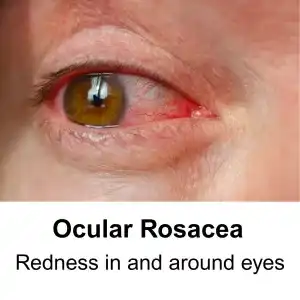
Common signs and symptoms include:
Facial Redness – Persistent redness or flushing, especially across the nose and cheeks.
Visible Blood Vessels – Tiny, broken blood vessels may appear near the surface of the skin.
Acne-like Bumps – Small, red, or pus-filled bumps that can be tender and painful.
Burning or Stinging Sensation – The skin may feel sensitive, warm, or sting when exposed to triggers like sun, wind, or skincare products.
Dry Skin – skin may appear dry, rough, scaly, or thickened (in severe cases).
Eye Symptoms – Red, irritated, or dry eyes (ocular rosacea)
Edema – puffiness or swelling in the face
What Causes Rosacea?
While the exact cause of rosacea is still not fully understood by medical science, many factors may play a role in the development of this skin condition. It is an inflammatory response that may be triggered by the immune system, certain foods, emotional stress, or environmental conditions like sun (U/V rays), heat, or wind. Genetics probably plays a role, as well.
Many people who suffer from rosacea have higher levels of mast cells. Some also have skin mites (Demodex mites). Demodicosis (face mite infestation) is not uncommon, but can show up in increased amounts in people who have rosacea and may be one of the factors that triggers the inflammatory response that contributes to rosacea flare-ups.
SIBO, or intestinal bacterial overgrowth, can sometimes contribute to rosacea.
Rosacea Treatment
A doctor or dermatologist typically diagnoses rosacea based on its characteristic signs and patient history. In some cases, a skin biopsy or other tests might be done to rule out other conditions like lupus or allergic dermatitis.
Common treatments include:
- Topical medications like metronidazole or azelaic acid. Some medications for rosacea constrict blood vessels to reduce redness, while others are antiparasitics
- Retinoids (Vitamin A)
- Oral antibiotics (doxycycline, minocycline) to reduce inflammation
- Laser therapy for visible blood vessels
- Lifestyle and trigger avoidance (avoiding sun exposure, alcohol, spicy foods)
While these treatments can help manage symptoms, rosacea often returns when treatments are stopped, and long-term antibiotic use can affect gut health and immunity.
Can Acupuncture Help Rosacea?

In Traditional Chinese Medicine, rosacea is viewed as a result of internal imbalances that manifest as external skin changes. The skin is seen as an extension of the body’s internal state.
According to TCM theory, rosacea would usually be considered the result of stagnation of Qi, blood, and heat in the body.
Diagnostic patterns that an acupuncturist might observe as being the root cause of rosacea might include:
- Wind-heat of the lung meridian
- Damp heat of spleen and stomach
- Heat stagnation in the liver channel
Heat and toxicity in the lungs and stomach can create excess internal heat, which may rise to the surface, causing redness, flushing, and pustules.
Stagnation of Qi and blood, along with chronic stress, hormonal changes, and dietary habits can impede the flow of qi and blood, leading to stagnation and visible capillaries.
In some patients, dampness combined with heat can cause swelling, acne-like bumps, and increased oiliness.
In long-standing rosacea, depletion of yin (cooling, moistening energy) can cause lingering redness and sensitivity.
How TCM Treats Rosacea
Acupuncture and Traditional Chinese Medicine take a personalized approach to rosacea, focusing on restoring balance within the body and addressing both internal and external symptoms.
Acupuncture works by:
- Reducing systemic and local inflammation
- Improving blood flow and microcirculation
- Regulating the autonomic nervous system
- Helping balance the gut-skin connection
- Calming the body and reducing stress, a common rosacea trigger
Research supports acupuncture as an effective therapy for rosacea. A review and analysis of studies found that a complementary treatment for rosacea combining conventional treatment and TCM therapy reduced the recurrence of symptoms. Acupuncture can reduce flushing, redness, and skin lesions associated with rosacea by modulating inflammatory pathways and promoting tissue healing.
One published case study demonstrated that a patient who had gone through 18 months of conventional treatment for rosacea with unsatisfactory results experience significant improvement after 3 acupuncture treatments, with no recurrence of a flare up in the subsequent six months. Laser Doppler showed increased blood microcirculation (blood flow) in the localized area of the skin rash.
Chinese herbs can be used both internally and externally to reduce redness, clear heat, and support overall skin health. The herbs in one TCM herbal remedy often used to treat rosacea—Liang Xue Wu Hua Tang—for example, works to remove toxins, cool and activate blood, and disperse wind. A traditional formula may be modified to suit the patient’s specific presentation, making TCM highly individualized.
Skincare for Rosacea
In addition to acupuncture and herbs, a TCM practitioner will recommend:
Avoiding rosacea triggers like alcohol, caffeine, and spicy foods.
- Incorporating cooling, anti-inflammatory foods (e.g., leafy greens, cucumber).
- Managing stress and promoting relaxation.
- Maintaining a consistent skincare routine using gentle, hydrating products.
By addressing the root causes of rosacea and working with the body’s natural balance, acupuncture and Traditional Chinese Medicine can help reduce the frequency and severity of rosacea outbreaks, often yielding long-lasting results.
Acupuncture Near Me for Rosacea in West Los Angeles
If you’re tired of dealing with rosacea and want a natural approach that supports both your skin and overall health, we’re here to help. At Art of Wellness Acupuncture, we specialize in treating rosacea and other skin conditions with personalized acupuncture and herbal therapy. Contact us today to book your consultation and take the first step toward calmer, clearer skin.
*This article is for education from the perspective of Traditional Chinese Medicine only. The education provided by this article is not approved by FDA to diagnose, prevent, treat and cure human diseases. It should not stop you from consulting with your physician for your medical conditions. Traditional Chinese Medicine is based on Qi, which is an invisible force that usually cannot be observed by modern science. Because science focuses on testing ideas about the natural world with evidence obtained through observation, these aspects of acupuncture can’t be studied by science. Therefore acupuncture and Chinese herbs are often not supported by double-blind, randomized trials, and they are considered alternative medicine therapies in the United States.
Lymphatic Drainage With Acupuncture and TCM
By Xiaomei Cai, L.Ac., Ph.D. and Qineng Tan, L.Ac., Ph.D.
Persistent swelling in your arms, legs, or other areas of your body? This could be a sign of lymphedema, a condition caused by the buildup of lymphatic fluid. Acupuncture and Traditional Chinese Medicine (TCM) offer a gentle and effective way to promote lymphatic drainage and support the body’s natural detoxification process.
What Is Lymphedema?
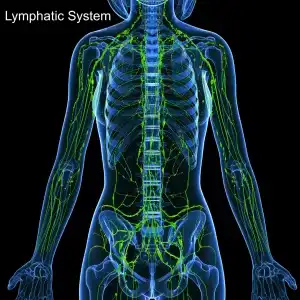
The lymphatic system is a complex network of nodes, tubes and ducts that move lymph fluid through the body, carrying immune cells (like T cells, B cells, and NK cells) that fight against bacteria, viruses, cancer cells, and damaged cells.
Lymphedema is a chronic condition that occurs when the lymphatic system is unable to properly drain lymph fluid, leading to fluid retention and tissue swelling. When the system is blocked or damaged, lymph can accumulate in the tissues, causing swelling and discomfort.
Top 10 Symptoms of Lymphedema
Signs of lymphedema, or lymphatic edema, can develop slowly over time or come on quite suddenly. At first, you may notice that a part of your body is a little swollen, or that your arm or leg just seems a little bit more swollen and stiff than the other one. Your clothes might seem a little bit tighter.
You might notice that you can’t see veins in your limbs, when you used to be able to. Your joints just may seem stiff. It can be easy to attribute mild symptoms of lymphedema to hot weather, general inflammation, or simply aging.
As lymphedema progresses to more severe stages, you may begin to notice that the affected areas are always stiff and swollen, firm to the touch, and that the skin in those areas is becoming noticeably thicker.
Common symptoms of lymphedema include:
- Swelling in the arms, legs, fingers, toes, face, or trunk
- A feeling of heaviness or tightness in the affected area, restricted range of motion
- Aching or discomfort in the swollen limb
- Recurring infections in the affected area
- Hardening or thickening of the skin (fibrosis), redness, itchy skin, rosacea
Symptoms of lymphedema may worsen over time if they are not addressed. Acupuncture and TCM offer a holistic way to treat lymphedema and manage the underlying conditions that cause swelling.
Common Causes of Lymphedema
There can be many different factors that lead to a buildup of lymphatic fluid. A few of the most common causes of lymphatic edema include:
- Surgical removal of lymph nodes (commonly due to cancer treatment)
- Radiation therapy that damages lymph vessels or nodes
- Infections that cause inflammation and blockage of lymphatic vessels
- Cancer that spreads to or blocks lymph nodes
- Injury or trauma to the lymphatic system
- Congenital malformations or underdeveloped lymphatic vessels (primary lymphedema)
- Obesity and sedentary lifestyle that impair lymph flow
Treatment for Lymphedema

Conventional treatment for lymphedema typically focuses on symptom management and improving quality of life. This may include a recommendation to wear compression garments like sleeves or stockings to encourage lymph flow. Manual lymphatic drainage (MLD): A specialized massage technique performed by trained therapists to move lymph fluid manually.
Gentle, regular physical activity may be recommended to help stimulate lymphatic circulation.
Machines known as Pneumatic compression devices, such as inflatable sleeves worn on the limbs, can mimic manual drainage.
In some cases, procedures to remove excess tissue or improve drainage pathways.
While these methods can help manage the symptoms, they often need to be maintained consistently and may not address the underlying systemic imbalances.
TCM View of Lymphedema
In Traditional Chinese Medicine, lymphedema is viewed as a disruption of the body’s natural flow of Qi (vital energy) and fluids. According to TCM theory, the spleen plays a central role in fluid metabolism. When the spleen Qi is weak or deficient, it cannot properly transform and transport fluids, leading to dampness and phlegm accumulation. This internal dampness can settle in the limbs and cause swelling.
Lymphedema may also be related to stagnation of Qi and blood, particularly in the channels (meridians) that traverse the affected area. External factors like trauma, surgery, or radiation can block the flow of Qi and blood, creating what TCM refers to as “blood stasis.”
Key TCM patterns that may contribute to lymphedema include:
- Spleen Qi deficiency
- Damp accumulation
- Qi stagnation
- Blood stasis
Can Acupuncture Help With Lymphatic Drainage?

Acupuncture helps to regulate the flow of Qi and blood through the meridians. When specific points are stimulated, they can promote circulation and encourage the movement of stagnant fluids.
Herbal medicine and acupuncture treatments can strengthen the spleen’s function of fluid transformation and transport. Strengthening the kidneys also helps resolve chronic dampness and supports the body’s ability to detoxify.
Research has shown that acupuncture has anti-inflammatory and analgesic effects. For patients experiencing pain, heaviness, and aching due to lymphedema, acupuncture can provide relief.
A healthy lymphatic system is essential for immune function. Acupuncture has been found to modulate immune activity and may help reduce the frequency of infections associated with lymphedema.
Gentle massage techniques like Tui Na and Gua Sha can be applied along the meridians to manually stimulate lymphatic drainage. Unlike deep tissue massage, these methods work with the body’s energy system to promote gentle, effective movement of fluids without overwhelming the tissues.
One study of women who had breast cancer related lymphedema found that twice weekly acupuncture sessions over the course of four weeks helped reduce swelling in their arms.
A review of studies on acupuncture treatment for cancer patients showed that acupuncture not only helped with lymphatic swelling, but also helped to relieve anxiety and depression, nausea and vomiting, and chemotherapy induced neuropathy.
Acupuncture Near Me for Lymphatic Drainage in West Los Angeles
Lymphedema can be a chronic and frustrating condition, but there are holistic options that go beyond symptom management. Acupuncture and TCM offer time-tested methods to support lymphatic drainage, strengthen the body’s natural detox systems, and relieve discomfort. If you’re living with lymphedema or chronic swelling, reach out to us at Art of Wellness Acupuncture in West Los Angeles. We’d be happy to create a personalized treatment plan to help you feel lighter, more comfortable, and more energized again.
*This article is for education from the perspective of Traditional Chinese Medicine only. The education provided by this article is not approved by FDA to diagnose, prevent, treat and cure human diseases. It should not stop you from consulting with your physician for your medical conditions. Traditional Chinese Medicine is based on Qi, which is an invisible force that usually cannot be observed by modern science. Because science focuses on testing ideas about the natural world with evidence obtained through observation, these aspects of acupuncture can’t be studied by science. Therefore acupuncture and Chinese herbs are often not supported by double-blind, randomized trials, and they are considered alternative medicine therapies in the United States.
How to Treat Atopy with Acupuncture and TCM
By Xiaomei Cai, L.Ac., Ph.D and Qineng Tan, L.Ac, Ph.D.

Do you suffer from more than one kind of allergy? Asthma, food allergies, eczema, hives, hay fever? “Atopy” is the tendency to have several different kinds of allergic reactions, or conditions such as atopic dermatitis. Acupuncture and TCM can help relieve allergy symptoms and itchy rash.
What Is Atopy?
The term “atopy” refers to a collection of allergic conditions that a person might experience all together. Atopic disorders include asthma, allergic dermatitis or eczema (red, inflamed, itchy skin), frequent urticaria or hives, and allergic reactions to foods and environmental allergens.
If you frequently experience allergy symptoms, like itchy eyes, skin rashes, and shortness of breath, then you may have atopy.
Atopy is known to be related to a heightened immune response that occurs because of Immunoglobulin (IgE) antibodies. Atopic dermatitis, in particular, is associated with higher than usual levels of IgE.
IgE antibodies are proteins produced by the immune system. They help fight off infection and react when a person is exposed to allergens, like certain foods (i.e. dairy, wheat, nuts), insect venom, ragweed and other plants that trigger hay fever symptoms, and some medications.
When IgE is produced and interacts with receptors in the body, it triggers allergic reactions, such as inflammation that constricts the airways (asthma), makes skin turn red and itchy (eczema, dermatitis, hives), produces excess mucus (runny nose, allergic rhinitis), or sudden drop in blood pressure (anaphylaxis).
People with atopy can sometimes have up to ten times the usual amount of IgE in their bloodstream. IgE levels can also be elevated in people with autoimmune conditions like rheumatoid arthritis (RA), psoriasis, and lupus.
Is Atopy an Autoimmune Disease?
While atopy, and atopic dermatitis or atopic eczema, are related to the immune system, and are considered to be associated with autoimmune disorders, such as Crohn’s disease, Celiac disease, alopecia areata, and ulcerative colitis, atopy itself is not currently categorized as an autoimmune condition.
Treatment for Atopy

Typical medical treatment for atopy involves prescription corticosteroid creams and antihistamines to control the body’s exaggerated immune response.
Prolonged use of corticosteroids can lead to many unwanted side effects, including weight gain, swelling, high blood pressure, elevated blood sugar levels, loss of bone mass, mood swings, and increased risk of infections.
Reliance on antihistamines can cause side effects, too, including drowsiness, blurred vision, dry mouth, problems with urination, and liver problems.
Acupuncture and TCM offer a holistic way to help relieve allergic conditions, including atopic disorders, without the toxic side effects of pharmaceutical drugs.
Can Acupuncture Help Atopy?
Treatment of allergies with TCM goes back thousands of years. Centuries of observation, study, and treatment with acupuncture and herbal formulas have led to the development of treatment regimens that can help address both patterns of allergy symptoms and the underlying systemic imbalances that cause them.
One of the most prominent concepts in TCM theory is that of Yin and Yang, two opposing yet complementary forces. When Yin and Yang are balanced within the body, systems work harmoniously. When Yin and Yang are out of balance, disease occurs.
According to TCM theory, allergic diseases arise due to imbalances in Yin and Yang that contribute to either an exaggerated response from the immune system, or a suppression of the immune response. This concept is roughly analogous to what science has shown about pro-inflammatory cytokines and anti-inflammatory cytokines.
In TCM, we see people’s health as being very much influenced by their environment, emotions, nutrition, stress, etc. We also acknowledge that each person is born with certain attributes of their constitution, or foundational health. People who are prone to allergies have inherited certain physiological conditions that make them more susceptible to these problems. However, this might show up differently in different individuals, depending on deficiencies within their organ systems.
For example, one person may have Qi deficiency in the lungs, which will translate into allergic reactions that affect the respiratory system and skin, while another may have deficiency in the stomach or spleen, which can lead to damp-heat conditions that cause eczema. Liver deficiency can lead to “wind” conditions like hives, and so on.
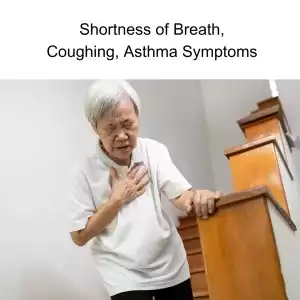
Therefore, the aim in using TCM to treat atopy is to address the overall balance of yin and yang and also to address more specific deficiencies in the organ systems. Acupuncture and herbs can also strengthen the constitution and the immune system, so that a person is better able to fight off external pathogens.
Every person experiences atopy in their own unique way, depending on their symptoms. Acupuncture treatment and other TCM modalities, especially herbal medicine, can be personalized for each individual patient.
Acupuncture can be very effective for relieving the uncomfortable symptoms triggered by atopic conditions. For example, studies have shown that acupuncture treatment can help reduce the intensity of chronic itching due to dermatitis.
A review of 14 studies on TCM to treat atopic eczema concluded that patient who received acupuncture treatment experienced less severe symptoms, compared with patients who were given antihistamines.
Acupuncture Near Me for Atopy in West Los Angeles
Drs. Tan and Cai at Art of Wellness Acupuncture in Los Angeles have over 35 years of experience helping patients who are suffering from allergic conditions. Acupuncture and herbs can help relieve itchy rashes, respiratory symptoms, food sensitivities, and other immune issues. Please do not hesitate to come in for consultation, to see if we can help you find relief from a multitude of uncomfortable symptoms of atopic dermatitis, hives, and other allergic reactions.
*This article is for education from the perspective of Traditional Chinese Medicine only. The education provided by this article is not approved by FDA to diagnose, prevent, treat and cure human diseases. It should not stop you from consulting with your physician for your medical conditions. Traditional Chinese Medicine is based on Qi, which is an invisible force that usually cannot be observed by modern science. Because science focuses on testing ideas about the natural world with evidence obtained through observation, these aspects of acupuncture can’t be studied by science. Therefore acupuncture and Chinese herbs are often not supported by double-blind, randomized trials, and they are considered alternative medicine therapies in the United States.
How to Protect Yourself When Air Quality Is Poor
By Qineng Tan, L.Ac. Ph.D. and Xiaomei Cai, L.Ac., Ph.D.

During difficult times—natural disasters and fires, in particular—it is more important than ever to protect and optimize your physical, mental, and emotional health.
When air quality in your area is poor, it is necessary to take measures to protect your health and that of your family. Breathing in smoke, even for a short period of time, can have an immediate, negative impact on your health.
Even if you can’t smell it, smoke and other air pollution can irritate your nose, eyes, and throat, and even make you feel nauseated.
Smoke inhalation affects your respiratory air passages and lungs, causing swelling that leads to wheezing and other problems with breathing.
You may not feel anything right away, but the damage is happening, as your body is not getting the oxygen it needs, and you may begin to notice it after a few hours.
Other effects of inhaling smoke and chemicals in the air include:
- Coughing, phlegm
- Wheezing, asthma attack
- Scratchy throat
- Irritated sinuses, sinus pain
- Headache
- Nausea
- Burning, stinging eyes, watery eyes, or dry eyes
- Runny nose, sinus drainage
Top 5 Tips for Preventing Smoke Pollution Effects

Here are some tips to help you best deal with the effects of smoke air pollution:
- Stay inside as much as possible. When going out, wear a good quality mask, ideally an N95 mask. If you don’t have an N95 mask, a surgical mask, cloth mask, or scarf is better than nothing, to help keep smoke from getting into your throat, nose, and lungs.
- When in your car, use the setting that recirculates the air, which prevents outside air from entering the cabin of your car.
- Stay hydrated. Drink plenty of water and warm liquids: herbal tea, body temperature lemon water, and broths. Chrysanthemum tea is an especially good choice, as it is calming, and good for soothing eye irritation.
- Irrigate your nasal passages with saline solution, which can help relieve allergic rhinitis.
- Use an air purifier with a HEPA filter in your home to filter particulate matter out of the air. Keeping house plants also helps keep the air in your home clean.
It is natural to feel anxiety and emotional stress when bad things are happening all around you. It is essential that you take time to calm and center yourself, so that you can make good decisions and be there for your loved ones and neighbors.
Take time to meditate and care for yourself. Show your love and concern for those around you, and don’t hesitate to reach out and ask for help.
Avoid reliance on caffeine, alcohol, and sugar. These things can cause dehydration, inflammation, and overstimulation. Be sure you and family are drinking plenty of water and eating nourishing foods.
One of our favorite recipes that helps to clear mucus from the lungs is to puree steamed asian pears, mash, and eat as you would applesauce. This traditional home remedy for lung congestion is also helpful when someone has bronchitis or a stubborn chest cold.
Listen to soothing music. Don’t keep the news programs on all the time. Do what you need to do to have your essentials packed and ready, without overreacting.
Do your best to keep a positive mindset. Trust yourself to know what is best for you and your family. You have come through difficulties before, and you will do it again.
From all of us at Art of Wellness, we encourage you to stay strong and healthy through this crisis. We will be here to help you in every way we can.
*This article is for education from the perspective of Traditional Chinese Medicine only. The education provided by this article is not approved by FDA to diagnose, prevent, treat and cure human diseases. It should not stop you from consulting with your physician for your medical conditions. Traditional Chinese Medicine is based on Qi, which is an invisible force that usually cannot be observed by modern science. Because science focuses on testing ideas about the natural world with evidence obtained through observation, these aspects of acupuncture can’t be studied by science. Therefore acupuncture and Chinese herbs are often not supported by double-blind, randomized trials, and they are considered alternative medicine therapies in the United States.
How to Treat Flu With Acupuncture and TCM
By Xiaomei Cai, L.Ac., Ph.D. and Qineng Tan, L.Ac., Ph.D.
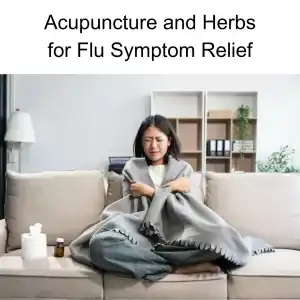
Coughing, fatigue, body aches, fever? The flu often comes on more suddenly and intensely than a common cold. Acupuncture and Traditional Chinese Medicine (TCM) offer holistic treatment for the flu, alleviating flu symptoms, strengthening the immune system, and helping your body recover faster and avoid complications.
What Is the Flu?
Influenza, or “the flu,” is a viral infection that targets the respiratory system. Caused by various strains of the influenza virus, the flu spreads easily through respiratory droplets when someone sneezes, coughs, or talks, or by touching contaminated surfaces and then touching your mouth, nose, or eyes.
Unlike the common cold, the flu can lead to complications like sinus infections, bronchitis, or pneumonia, especially for children, older adults, pregnant individuals, and people with chronic health conditions.
Flu symptoms generally last 5–7 days, but fatigue and weakness may linger for weeks. Complications like pneumonia, bronchitis, or worsening of chronic conditions can occur, making proper care and recovery essential.
Acupuncture treatment and traditional Chinese herbal remedies can help make you feel more comfortable, fight off the virus, shorten the duration of the flu, and help prevent further complications, like pneumonia.
Top 10 Flu Symptoms
While flu symptoms can vary, they are typically more intense than those of a cold. Common flu symptoms include:
- High fever (usually above 100°F/37.8°C)
- Chills and sweating
- Severe fatigue
- Body aches and muscle pain
- Headache
- Dry, persistent cough
- Sore throat
- Runny or stuffy nose
- Shortness of breath or chest discomfort
- Nausea, vomiting, or diarrhea (more common in children)
The flu’s systemic effects, such as body aches and fever, set it apart from the cold, which tends to stay localized in the nose and throat.
Conventional Flu Treatment

When most people experience flu symptoms, they usually turn to over-the-counter (OTC) remedies to manage discomfort and speed recovery. Common options include pain relievers like acetaminophen or ibuprofen to reduce fever, body aches, and headaches. Decongestants such as pseudoephedrine can help alleviate nasal congestion, while antihistamines may reduce runny nose and sneezing. Cough suppressants and expectorants are frequently used for managing cough symptoms. These remedies do not treat the flu virus itself but aim to ease symptoms and improve comfort during recovery.
When consulting a medical doctor, the advice may differ based on the severity of symptoms and the patient’s health history. Doctors typically recommend rest, plenty of fluids, and fever management with OTC medications. For higher-risk patients, such as the elderly, young children, or those with underlying conditions, a physician may prescribe antiviral medications like oseltamivir (Tamiflu) or baloxavir (Xofluza). These antivirals work best when started within 48 hours of symptom onset and may help reduce the duration and severity of the flu. Doctors may also advise preventive measures such as flu vaccines to reduce the likelihood of severe flu symptoms in the future.
How TCM and Acupuncture View and Treat the Flu
In Traditional Chinese Medicine (TCM), the flu is understood as an invasion of external pathogens, which disrupt the body’s internal balance. These pathogens are categorized by patterns that describe the nature of the illness and its symptoms.
For the flu, the two most common TCM diagnostic patterns are:
Wind-Cold Flu: Symptoms include chills, body aches, mild fever, and a runny nose with clear mucus. This type of flu often makes you feel cold and tired. Treatment in TCM focuses on dispersing wind and cold, warming the body, and alleviating muscle aches.
Wind-Heat Flu: Symptoms include a high fever, sore throat, cough, and yellow mucus. People with wind-heat flu may feel hot, irritable, and experience dryness or redness in the throat and nasal passages. Treatment focuses on clearing heat, reducing inflammation, and supporting the body’s ability to heal.
In TCM, the flu is not seen as a single illness but as a dynamic condition unique to the individual. Acupuncture treatment for the flu aims to restore balance by addressing the specific pattern of symptoms and supporting the immune system.
An acupuncturist will treat you with an individualized treatment plan, including acupuncture points and herbs to help relieve specific symptoms and address underlying conditions.
Can Acupuncture Help the Flu?
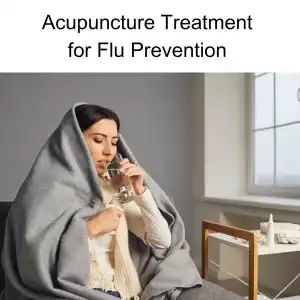
Acupuncture helps to boost the immune system and relieve symptoms like body aches, congestion, and fever by stimulating specific points that regulate the body’s energy (Qi).
Acupuncture is a safe and natural way to support the body during and after the flu. Specific acupuncture points are used to target the symptoms and promote faster recovery by relieving nasal congestion and sinus pressure. Points on the face and head can help open the nasal passages and reduce sinus pain.
Acupuncture helps improve blood circulation and relax the muscles to ease body aches and discomfort. Points along the lung and throat meridians can help relieve dryness, inflammation, and coughing.
In addition to acupuncture, herbal medicine is often used to support the body during flu recovery. Herbal formulas like Yin Qiao San or Gan Mao Ling are commonly prescribed to address early-stage flu symptoms, such as sore throat and fever. Other remedies, like ginger tea or custom herbal combinations, may be recommended based on the individual’s specific needs and flu pattern.
Preventing the Flu with Acupuncture and TCM
The best way to avoid the flu is to strengthen your immune system before flu season hits. TCM emphasizes maintaining balance in the body through regular acupuncture treatments, seasonal herbal formulas, and healthy lifestyle habits. Diet, sleep, and stress management are also key components of flu prevention in TCM. Foods like warming soups, ginger, garlic, and green vegetables can help nourish the body and support immunity.
Traditional Chinese Medicine (TCM) has demonstrated significant promise in the prevention and treatment of influenza through various mechanisms, including antiviral effects, immune modulation, and anti-inflammatory properties. Classical TCM prescriptions incorporate combinations of herbs that target both the virus and the host’s immune response.
TCM contributes to indirect antiviral activity by regulating the host immune system. Studies reveal that herbal prescriptions like Sheng Jiang San (SJS) and Yinqiao powder help modulate cytokine activity, which is associated with lung inflammation in influenza.
TCM approaches flu treatment through a dual action: directly targeting the virus and enhancing the host’s immune defenses while controlling inflammation.
Getting regular acupuncture treatments and taking your herbal formula is one of the best ways to prevent flu and the common cold.
Acupuncture Near Me for Flu Relief in Santa Monica and West LA
Whether you’re dealing with the flu or looking for preventative care during flu season, acupuncture and TCM offer a natural, effective approach to health and wellness. At Art of Wellness, our experienced practitioners tailor treatments to address your unique symptoms and help your body recover faster. Contact us today to learn more about how we can support your health through every season.
*This article is for education from the perspective of Traditional Chinese Medicine only. The education provided by this article is not approved by FDA to diagnose, prevent, treat and cure human diseases. It should not stop you from consulting with your physician for your medical conditions. Traditional Chinese Medicine is based on Qi, which is an invisible force that usually cannot be observed by modern science. Because science focuses on testing ideas about the natural world with evidence obtained through observation, these aspects of acupuncture can’t be studied by science. Therefore acupuncture and Chinese herbs are often not supported by double-blind, randomized trials, and they are considered alternative medicine therapies in the United States.